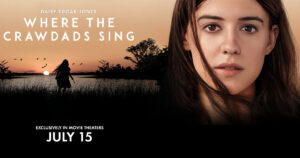Where the Crawdads Sing
Posted on July 14, 2022 at 5:25 pm
C-| Lowest Recommended Age: | Mature High Schooler |
| MPAA Rating: | Rated PG-13 for substance abuse, strong language, suggestive material, and smoking. |
| Profanity: | Strong language |
| Alcohol/ Drugs: | Alcohol and drunkenness |
| Violence/ Scariness: | Domestic violence, attempted rape, murder |
| Diversity Issues: | None |
| Date Released to Theaters: | July 15, 2022 |
| Date Released to DVD: | September 12, 2022 |

The book is a fantasy along the lines of Green Mansions or Tarzan, or Blue Lagoon or The Jungle Book, where beautiful children and young people live in nature, free from the corruption of the so-called civilized world.
Kya lives in a remote cabin in the marshes of North Carolina. Her father was drunk and abusive, and so her mother left, and then her older sisters, then her brother. Her father briefly cared for her, giving her his old army pouch to collect the shells and plants she was observing so closely, but then he left, too, and she was alone.
She supports herself by collecting mussels and selling them to the local store, run by a kindly couple. She leaves school after one day because the other children make fun of her and call her “marsh girl.” And she grows up to be movie-star gorgeous (Daisy Edgar-Jones of “Under the Banner of Heaven”) with shiny hair, robust health, and perfect teeth. She is befriended by a gentle boy named Tate (Taylor John Smith), who also lives on the marsh and loves the natural world. He teaches her to read and promises he will not desert her when he goes to college. But he does.
And then a young man from the town, romances her. His name is Chase (Harris Dickinson), and he, too makes promises. She is not sure how she feels about him but she is tired of being alone. HINT (this movie is not subtle): one of these young men supports her passion for drawing and writing about the nature around her and the other, when she sends her work to the publishers, the first one suggested and one accepts with enthusiasm, tells her not to get a big head about it. One is scrupulous about consent, one is not. Hmmm.
Kya’s knowledge of the world is very limited except when it is not. Never having seen a painting or illustration, she somehow creates exquisite drawings of plants and insects with an apparently endless supply of watercolor paints left behind by her mother. She is shy except when she isn’t.
As the movie begins, in 1969, Chase is dead. Kya is arrested for murder, based on circumstantial evidence and the town’s contempt for “marsh girl.” Her backstory is interlaced with the trial. I will not spoil the outcome, which is revealed earlier in the book than in the movie, except to say the coda at the end is both preposterous and, in my view, undermines everything that has gone before.
Parents should know that this has strong material for a PG-13 including explicit sexual situations, attempted rape, domestic abuse, alcoholism, abandonment, and murder. Characters use strong language and drink alcohol and get drunk.
Family discussion: What can you observe in the nature around you? Why did Tom Milton defend Kya? How did Tate feel about his discovery?
If you like this, try: “Green Mansions” and “The Jungle Book” and the book by Owens

